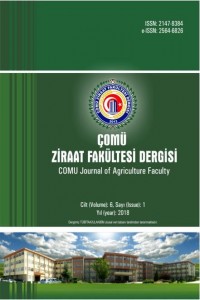Effect of Plant Growth Promoting Rhizobacteria on Growth, Nutrient Uptake and Physiological Parameters in Sugar Beet under Different Watering Regimes
Abstract
Two experiments were conducted in order to investigate the of nine ACC deaminase-containing, IAA-producing, N2-fixing and/or P-solubilizing bacteria, on the growth, yield, chlorophyll, macro- and micro-nutrient content, and selected morpho-physiological parameters of sugar beet, under five watering regimes. The experiment was set up in two sets; and the first set was harvested after 65 days and the second set was done after 130 days. Inoculation with multi-traits bacteria stimulated overall plant growth, including sugar content, root and leaf yield and the leaf chlorophyll contents, and macro- and micro-nutrient uptake, which might partly contribute to the activation of the processes involved in the alleviation of the effect of water stress. According to the results, at the level of 75, 50 and 25% of WHC under water constraint, beet yield parameters BF4, BF6, Bio-organic and mineral fetilizer was found effective. As an average of the five water regimes, bacterial formulations increased dry storage root weight by 6.5-27.7% and 9.1-27.3% and dry leaf weight by 6.1-26.7% and 3.9-25.8% at the first and second trials, whereas, mineral fertilizers (NP) and bio-organic fertilizers increased dry storage root weight by 24.5% and 9.3-15.5% and 20.2 and 9.2-15.2%, and dry leaf weight by 23.5% and 11.7-23.2% and 22.2% and 3.3-21.9%, respectively, compared with control. Moreover, water stress in sugar beet plants was alleviated partially by the inoculation with bacterial strains. Our results provide strong evidence that the role of bacteria in the performance of sugar beet plants in stressful environment of soils not only the improved plant growth, yield, and macro- and micro-nutrient content, but also the alleviation of water deficit and waterlogging stress.
Keywords
Water deficit and waterlogging stress Nutrients uptake Plant growth-promoting bacteria Enzyme activity Hydrogen peroxide Malondialdehyde
References
- Abbasi, S., Zahedi, H., Sadeghipour, O., Akbari, R., 2013. Effect of plant growth promoting rhizobacteria (PGPR) on physiological parameters and nitrogen content of soybean grown under different irrigation regimes. Res. Crop. 14 (3): 798-803.
- Armada, E., Portela, G., Roldán, A., Azcón, R., 2014. Combined use of beneficial soil microorganism and agrowaste residue to cope with plant water limitation under semiarid conditions. Geoderma 232-234: 640–648.
Farklı Sulama Rejimlerinde Bitki Gelişmesini Teşvik Eden Bakterilerin Şeker Pancarı Gelişme, Besin Alımı ve Fizyolojik Parametreleri Üzerine Etkisi
Abstract
Bu araştırmalar beş farklı sulama rejimi altında, ACC deaminaze içeren, IAA üretici, Azot fikseri ve Fosfat çözücü bakteri uygulamalarının şeker pancarı gelişme, makro ve mikro besin elementi alımı ve bazı morfo-fizyolojiklerine etkisini belirlemek amacıyla yürütülmüştür. Denemeler biri 65 gün, ikinci ise 130 günlük olmak üzere iki set halinde kurulmuştur. Çok özelliklere sahip bakteri aşılamaları, şeker oranı, kök ve yaprak verimi, yaprak klorofil içeriği, makro ve mikro element alımı dahil gelişmeyi teşvik etmiş ve ayrıca su stresinin etkisinin hafifletilmesinde yer alan süreçlerin aktivasyonuna kısmen katkıda bulunabilmiştir. Sonuçlara göre, su tutma kapasitesinin %75, 50 ve 25'şi seviyesinde su kısıtı altında şeker pancarı verim parametreleri bakımından BF4 ve BF6 kombine bakteri, Biyo-organik ve mineral gübre uygulamaları etkin bulunmuştur. Beş sulama rejimi ortalaması olarak, bakteri formülasyonları, birinci ve ikinci deneme setinde sırasıyla, kuru depo kök ağırlığını %6,5-27,7 ve % 9,1-27,3 ve kuru yaprak ağırlığını ise % 6,1-26,7 ve % 3,9-25,8 oranında artırırken; kontrole kıyasla, sırasıyla, mineral gübre (NP) ve biyo-organik gübre uygulamaları sırasıyla kuru depo-kök ağırlığını % 24,5 ve % 9,3-15,5 ve %20,2 ve 9,2-15,2 ve kuru yaprak ağırlığını ise % 23,5 ve % 11,7-23,2 ve% 22,2 ve% 3,3-21,9 artırmıştır. Bakteri aşılamaları ile şeker pancarı su stresi kısmen hafifletilmiştir. Bu araştırma sonuçları, bakteri aşılamalarının stres koşullarındaki performansının sadece bitki gelişmesi, verim ve besin alımının iyileştirilmesinde değil, aynı zamanda su kısıtı ve aşırı su stresinin hafifletilmesinde de güçlü kanıtlar sağlamıştır.
Keywords
Su noksanlığı ve aşırı su stresi Besin alımı Bitki gelişmesini teşvik eden bakteriler Enzim aktivitesi Hidrojen peroksit Malondialdehit
References
- Abbasi, S., Zahedi, H., Sadeghipour, O., Akbari, R., 2013. Effect of plant growth promoting rhizobacteria (PGPR) on physiological parameters and nitrogen content of soybean grown under different irrigation regimes. Res. Crop. 14 (3): 798-803.
- Armada, E., Portela, G., Roldán, A., Azcón, R., 2014. Combined use of beneficial soil microorganism and agrowaste residue to cope with plant water limitation under semiarid conditions. Geoderma 232-234: 640–648.
Details
| Primary Language | English |
|---|---|
| Subjects | Agricultural Engineering |
| Journal Section | Articles |
| Authors | |
| Publication Date | December 29, 2020 |
| Published in Issue | Year 2020 Volume: 8 Issue: 2 |


